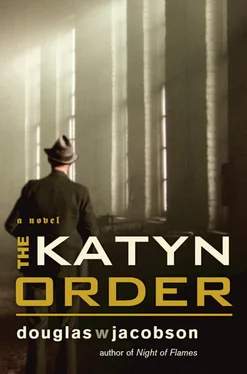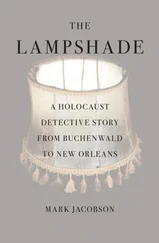She had no idea why SOE wanted to locate the Provider. She had never even known there was a connection between the two. During her years acting as a courier, she’d never met the Provider. It was just a name, someone in the channel who passed documents to the priest, or to someone in between. She really didn’t know; she didn’t need to know. All she had ever needed to know was to kneel at the confessional in this church between one and two o’clock in the afternoon on a Wednesday.
But why would SOE contact her? She hadn’t been an active part of the channel since she left for Warsaw at the start of the Rising, almost a year ago. Why now? Why me? She had no idea. But it was an assignment, and it was not her place to question it. She had been instructed to locate the Provider. And this was the only place to start.
A woman sitting on Natalia’s left nudged her elbow, indicating that it was her turn. Natalia took a deep breath, then stood up, and stepped around a marble pillar and over to the confessional. It was an enclosure of rich mahogany wood, a bit larger than a telephone booth, with a peaked roof and adorned with intricately carved scrollwork. A slatted wooden screen allowed the penitent to communicate with the priest waiting inside. Natalia knelt on the velvet-padded kneeler and whispered into the screen, “In the name of our Lord, I come seeking.”
There was a moment of silence. Then a voice from the other side whispered back, “Whom do you seek, my child?”
Natalia paused before responding, her tension momentarily relieved at the familiar voice and the customary words. “I seek the one who has provided us with so much.”
“It has been a long time,” the voice said.
“A difficult time,” Natalia answered.
When the voice spoke again there was a slight tremor. “The Provider is no longer among us.”
Natalia’s stomach tightened as she stared at the wooden screen. She swallowed hard, carefully choosing her next words. “Did he leave anything for me?”
Another moment of silence. Then the voice said, “This afternoon, five o’clock, Dietla and Stradomska. Get on the tram for Stare Miasto.”
The tram was crowded, and Natalia had to stand. The priest sat on the right side of the car, a newspaper folded under his arm. When they reached the first stop in the Stare Miasto District, the priest got up and pushed his way through the crowd. Natalia followed him out of the car.
As they walked toward the Rynek Glowny, Natalia waited for the priest to say something, but he was silent. He was a thin, severe-looking man in his sixties with sharp, chiseled features and an imperious manner that Natalia had at first found intimidating. In later years she had little patience for the man’s haughty nature and had rarely spoken with him outside of the confessional.
“What happened to the Provider?” she finally asked.
The priest remained silent, walking briskly, staring straight ahead.
“Is he alive?”
The priest slowed his pace and glanced at her. His face, partially hidden under his black, wide-brimmed hat, was pale, his eyes blank and distant. “He’s gone.”
“Gone where? When?”
“I don’t know. The day before the Russians arrived, he was just… gone.”
They entered the Rynek Glowny, an enormous cobblestone square surrounded by church spires, Medieval merchant halls and former residences of Krakow’s elite. They found a table at an outdoor café where they tried to order tea but had to settle for bitter, ersatz coffee. While they exchanged small talk about the weather, Natalia glanced at the folded newspaper which the priest had laid on the table. Inside would be an address handwritten in the margin.
The priest finished his coffee, his dull eyes darting around the busy market square. He whispered, “God be with you, my child.” Then he stood and walked away.
An hour later, Natalia found the address in the eastern section of the Kazimierz District. For centuries it had been a crowded, bustling district of apartment buildings, banks and synagogues, tailor shops and jewelers, butchers, clothing stores, and outdoor markets. The Jews who built it were gone now, murdered in the concentration camps of Auschwitz and Treblinka, and little remained in the area except decaying buildings, emaciated stray dogs foraging for scraps in the gutters, and crippled beggars, dressed in rags, holding empty cups in their bony hands.
Repeating the same procedure she had used during the war, Natalia let herself into the run-down apartment building and retrieved a key from the mailbox in the vestibule. She climbed the creaking stairs to the third floor, wondering if anyone still lived there, unlocked the door to a room at the end of the hall and locked it behind her. She opened the window a crack to let in a bit of fresh air, and stood in the center of the room listening to the silence. Then she got down on her knees and reached under the bed.
The package was wrapped in the usual brown paper, but it was smaller than the others she had retrieved in the same manner from other rooms in other shabby buildings. This package felt more like a book than the files of documents she had received during the years she had spent as part of the channel.
Natalia sat on the bed and held the package, turning it over in her hands, thinking about the hundreds of documents that had been passed along this same channel during the years of Nazi occupation, documents that she could never resist reading despite putting herself in even greater jeopardy by possessing the information. There had been meticulously prepared reports, including daily logs and charts filled with numbers, revealing inconceivable atrocities taking place behind the walls of Auschwitz, Treblinka and the other death camps of Poland.
Extreme risks had been taken by everyone along the channel, from the Provider to another unknown contact, then to the priest and finally to Natalia, who carried them on the train to Warsaw. The identities of those involved in the channel were a carefully guarded secret. Natalia knew only those with whom she had direct contact: the priest, Berta and Falcon. The documents had been passed along, and perhaps some had made it to London, New York or Washington. Natalia had no way of knowing. It hadn’t done any good. That much she knew. The carnage had escalated. Hundreds of thousands were murdered, perhaps millions.
And now, when the war had ended, the Nazis were defeated… the Provider is gone?
Natalia stared at the package, her nerves taut as piano strings. Then, very slowly, she removed the wrapping paper. Inside was the customary envelope containing currency, a thin stack of fifty-zloty banknotes to help her with expenses. There was also a book.
It was a leather-bound notebook, similar to a diary. The cover was worn, the edges of the pages frayed, as if having been thumbed through hundreds of times. She opened the cover and stared for a long time, confused by the handwritten words on the first page.
The Journal of Ludwik Banach
7 JUNE
NATALIA WOKE SUDDENLY. A noise in the hallway… footsteps… creaking stairs.
Then it was quiet.
She waited a moment, then stepped quietly across the room, parted the curtain and peeked out the window, squinting in the early morning sunlight. A scrawny, three-legged dog hobbled across the cobblestone alley, sniffing in the gutter. She dropped the curtain and glanced at her watch. Seven o’clock. What time had she fallen asleep? She had no idea.
The journal!
She spun around, her eyes darting to the bed, then to the floor. It was there, the tattered leather-bound notebook that she had spent the night reading. She picked it up and sat down on the bed, leafing through the pages, as though to make certain the words hadn’t changed.
Читать дальше












